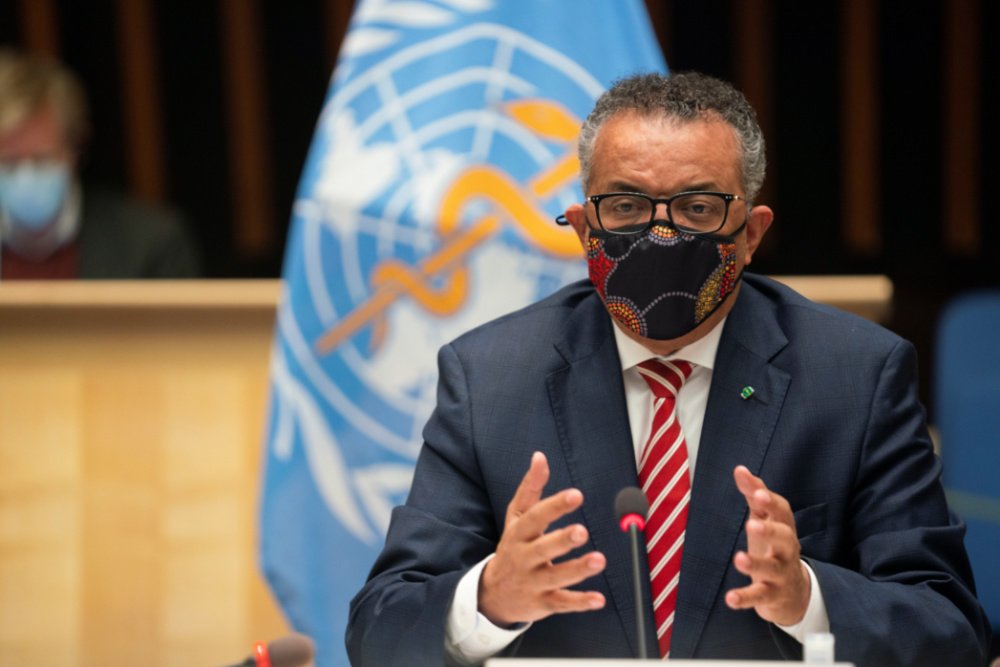Geneva, Switzerland
Reuters
A vaccine against COVID-19 may be ready by year-end, the head of the World Health Organization said on Tuesday.
WHO Director-General Tedros Adhanom Ghebreyesus called for solidarity and political commitment by all leaders to ensure equal distribution of vaccines when they become available.
“We will need vaccines and there is hope that by the end of this year we may have a vaccine. There is hope,” Tedros said in final remarks to the WHO’s executive board, without elaborating.

Tedros Adhanom Ghebreyesus, director general of the World Health Organization, attends a session on the coronavirus disease (COVID-19) outbreak response of the WHO executive board in Geneva, Switzerland, on 5th October. PICTURE: Christopher Black/WHO/Handout via Reuters.
Nine experimental vaccines are in the pipeline of the WHO’s COVAX global vaccine facility that aims to distribute two billion doses by the end of 2021.
The two-day board meeting, which examined the global response to the pandemic, heard calls from countries including Germany, Britain and Australia for reforms to strengthen the UN agency.
US President Donald Trump’s administration has strongly criticised the WHO’s role in the crisis, accusing it of being too close to China and not doing enough to question Beijing’s actions late last year when the virus first emerged in Wuhan.
Tedros has dismissed the suggestions and said his agency has kept the world informed.
Three independent panels reviewing WHO performance including its 2005 International Health Regulations – which set guidelines on trade and travel restrictions imposed during health emergencies – gave updates on their work.
The Independent Panel for Pandemic Preparedness and Response, led by former New Zealand Prime Minister Helen Clark and former Liberian President Ellen Johnson Sirleaf, met for the first time last month.
“We hope to get the real lessons that we can implement and prevent the same thing from happening,” Tedros said. “But I would like to assure you that WHO is ready to learn from this and change this organisation.
“During our transformation we promised this, we promised to keep change as a constant,” he said, referring to his program since taking the helm in 2017.
Meanwhile, Microsoft founder Bill Gates said on Tuesday that rich countries could be back to close to normal by late 2021 if a COVID-19 vaccine works, is ready soon and distributed properly at scale.
“By late next year you can have things going back pretty close to normal – that’s the best case,” Gates, 64, told The Wall Street Journal CEO Council.
“We still don’t know whether these vaccines will succeed,” Gates said. “Now the capacity will take time to ramp up. And so the allocation within the US, and between the US and other countries will be a very top point of contention.”
COVID-19 vaccines developed by Pfizer/BioNTech and AstraZeneca/Oxford University are two of the leading candidates in the race to be first to get regulatory approval in the West.
Gates, who made a fortune from Microsoft, has since given $US36 billion to the Bill & Melinda Gates Foundation, which aims to tackle extreme poverty and poor healthcare.
Last month the foundation signed an agreement with 16 pharmaceutical companies, which Gates said committed them to scaling up manufacturing at an unprecedented speed, and making sure that approved vaccines reach broad distribution as early as possible.
Vaccine race
Russia has pushed ahead with its COVID-19 vaccine with mass public vaccinations alongside the main human trial, raising concerns among some observers that it was prioritising national prestige over solid science and safety.
“We’re also talking with Russia and China,” Gates said. “None of their vaccines are in a Phase III trial with a highly regarded regulator overseeing that trial.”
Gates said that from a scientific point of view the Russian and Chinese vaccines were perfectly valid projects but the absence of a well-respected Phase III study could limit their attractiveness outside their respective countries.
“The Western companies are further ahead on doing these Phase III studies and so if those come out well and they’re offered at low cost, I doubt there’ll be a lot of Russian or Chinese vaccines going outside of those countries,” he said.
Gates added that in the United States people should be thinking about ways to reduce hesitancy about having a COVID-19 vaccine when one is ready.
“You know, here in the US, we should already be thinking about which voices will help reduce the hesitancy. And so we can get a level of vaccination that really has a chance of stopping [it].”
Asked who did best at balancing the competing health and economic needs, Gates said:
“South Korea, Australia – because this is an exponential event, a little bit of intelligence early on makes a huge difference,” he said.
– Additional reporting by PAUL SANDLE






